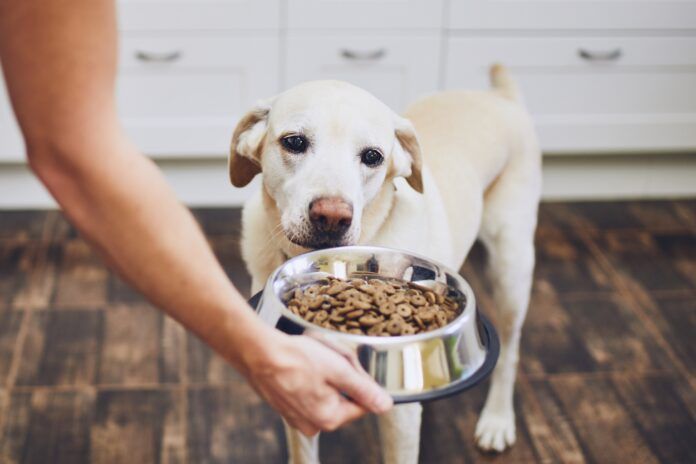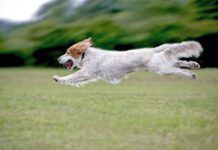Dogs like regular schedules, and that includes your dog’s feeding schedule. Most veterinarians recommend that dogs eat twice a day, approximately 12 hours apart. If it’s longer, you could cause nausea, as he gets hungry just like people do.
Feed your healthy adult dog twice a day. There is no best time to feed a dog. The time of day doesn’t matter as much as the time between meals. You can feed him at 5 p.m. or 9:30 p.m., provided you feed him at a roughly corresponding time the next morning. Don’t feed him at 6 p.m. on Friday night and then not until you wake up at 11:30 Saturday morning. If you need to change your dog’s feeding schedule, gradual changes over the course of 4 to 7 days are best.
You may need to adjust your dog feeding schedule by age or illness. Some canines, like puppies, seniors, nursing moms, and working/sporting dogs, need a lot of calories to maintain their weight and may need to be fed more often to accomplish that because you don’t want to overfeed him at a feeding. Some puppies need to eat four to six times a day.
If you do need to feed your dog more often, remember to feed smaller portions each time so you don’t overfeed him. If your dog needs four cups of food a day, and you feed him twice a day, that’s two cups in each feeding. If he cannot consume that much food at once, then you take the four cups and divide it evenly between the feedings.
Don’t feed your dog once a day, assuming he will eat when he’s hungry, sort of “free-choice.” He won’t. It’s most likely he’ll wolf it all down at once and be hungry 12 hours later. Free-choice feeding can make dog fat, and it can cause fights if you have more than one dog.
Feeding twice a day is an easy way to check on a dog’s health or to prepare him to adapt to changes, such as traveling or changing dog food. Two meals a day provides him with the stability he craves in his life, a tasty cornerstone that he can rely on. Feeding can also be a bonding moment between you and your dog.







I do wish that WDJ would publish only qualified experts to give advice on nutrition and health. The advice given here is very much open to question. A recent very large study, The Dog Aging Project, showed that feeding once a day leads to significantly better health outcomes.
“The Dog Aging Project, launched in 2019, has been gathering data on doggy diets and cognitive function, plus nine other categories of health. Information gathered on over 10,000 dogs was then analyzed to look for associations between diet and health profiles.
One meal a day was found to be associated with lower levels of health problems surrounding cognitive, kidney, and liver function plus fewer dental and gastrointestinal issues. While the correlation can’t be inferred as causation, it could be an indicator that intermittent fasting has similar benefits for dogs as those seen in mouse studies.”
“’We find that once-daily feeding is associated with better health in multiple domains,’ they concluded. ‘Future research with longitudinal data can provide stronger evidence for a possible causal effect of feeding frequency on health in companion dogs.’”
https://www.iflscience.com/is-intermittent-fasting-good-for-dogs-massive-study-weighs-in-on-possible-benefits-63540
Also: “After controlling for age, sex and breed, the team found dogs that were only fed once per day, rather than multiple times, appeared to have lower scores of cognitive disfunction, equivalent to the difference between a 7-year-old and 11-year-old dog.”
https://www.newsweek.com/dog-feed-once-day-cognitive-health-1649704#:~:text=After%20controlling%20for%20age%2C%20sex,11%2Dyear%;2Dold%20dog.
When I was young, our family dog was fed once a day.Though the food was likely not as good a quality as what I feed today, my childhood German Shepherd lived a healthy life until he was 14 years of age. For full disclosure, I have been feeding my dogs twice a day for probably twenty years or so but not 12 hours apart. Breakfast is between 9:30am – 10:30am and he is fed less than half of what he gets for dinner, which rolls around between 6pm-7pm. Usually. Sometimes in the summer, if we’re out at the park until it’s late, he might eat at 8pm or so.
All the research on the benefits of intermittent fasting directly contradicts the assertions made in this article by someone who doesn’t seem to have any particular qualifications in the fields of nutrition or medicine. I would advise readers to discuss their feeding schedule and food choices with their vets or to seek out a canine nutritionist.
I do wish that WDJ would publish only qualified experts to give advice on nutrition and health. The advice given here is very much open to question. A recent very large study, The Dog Aging Project, showed that feeding once a day leads to significantly better health outcomes.
“The Dog Aging Project, launched in 2019, has been gathering data on doggy diets and cognitive function, plus nine other categories of health. Information gathered on over 10,000 dogs was then analyzed to look for associations between diet and health profiles.
One meal a day was found to be associated with lower levels of health problems surrounding cognitive, kidney, and liver function plus fewer dental and gastrointestinal issues. While the correlation can’t be inferred as causation, it could be an indicator that intermittent fasting has similar benefits for dogs as those seen in mouse studies.”
“’We find that once-daily feeding is associated with better health in multiple domains,’ they concluded. ‘Future research with longitudinal data can provide stronger evidence for a possible causal effect of feeding frequency on health in companion dogs.’”
That is quoted from IFL Science
Als from Newsweek on the same study: “After controlling for age, sex and breed, the team found dogs that were only fed once per day, rather than multiple times, appeared to have lower scores of cognitive disfunction, equivalent to the difference between a 7-year-old and 11-year-old dog.”
When I was young, our family dog was fed once a day.Though the food was likely not as good a quality as what I feed today, my childhood German Shepherd lived a healthy life until he was 14 years of age. For full disclosure, I have been feeding my dogs twice a day for probably twenty years or so but not 12 hours apart. Breakfast is between 9:30am – 10:30am and he is fed less than half of what he gets for dinner, which rolls around between 6pm-7pm. Usually. Sometimes in the summer, if we’re out at the park until it’s late, he might eat at 8pm or so.
All the research on the benefits of intermittent fasting directly contradicts the assertions made in this article by someone who doesn’t seem to have any particular qualifications in the fields of nutrition or medicine. I would advise readers to discuss their feeding schedule and food choices with their vets or to seek out a canine nutritionist.
***My original post linked directly to the articles I quoted above. It was flagged for moderation review. The last time I posted such a comment the same thing happened and many weeks later, it is still “under review.” So this post contains no links but I did want to acknowledge the source of the quotes.
I’m a trainer and behaviorist and I have seen significant and rapid improvements in anxiety-based behaviors when adult dogs are fed twice a day instead of once, and puppies are fed more frequently depending on their age. Of course what you feed is as important, or more so, than how often. Dogs who “graze” on food left in the bowl to free feed are really just signaling they don’t really like the food. even dogs who eat all their food will be left feeling a nutritional void when they are fed a poor diet. I have found that feeding a raw diet rather than a processed one (kibble and canned foods) makes a huge difference.
I do believe we’ll need to wait and see on this. In the study itself they said at the end: “Future research with longitudinal data can provide stronger evidence for a possible causal effect of feeding frequency on health in companion dogs.” There are studies from the Dog Aging Project like the one about once-daily feeding and Association between physical activity and cognitive dysfunction in older companion dogs: results from the Dog Aging Project that point to cognitive dysfunction. The end of the study will tell, hopefully, the truth of the matter. I personally don’t believe that feeding twice daily, as long as it’s the correct amount daily, will end up causing cognitive decline. The other parts of the study though, like studying rapamycin, an immunosuppressive medication that has been used in humans for decades, and its use has been shown to increase lifespan, improve heart and cognitive function, and reduce age-related disease incidence in laboratory species. The Dog Aging Project team believes rapamycin may provide similar benefits to middle-aged, large-breed dogs. I’ve fed my dogs twice daily for over 50 years and my last companion left our family at the ripe old age of 17. He was as sharp as a pin the day he passed.
I think it depends on the dog. I fed my dogs twice daily and Jack And russels lived with to be 18 and 19 while Newfoundland made it to 16 active years. I think exercise and avoiding overweight are more important than how often you feed. My Whippet gets fed 3 times a day, looks very ery lean, but gets tummy upset if she eats too much at once, just doesnt
My Diana pawPrints is 92 lbs (down from 105) and is fed twice a day. No way would I feed her 3.5 cups of food in one sitting. For one thing I don’t want to invite bloat and the chances of her twisting her stomach after consuming that much food is too great. I don’t care how much a dog eats in a day, giving them more than 2 cups at a time just invites trouble.
If I had a dog that ate 6 cups of food a day I’d divide it into three meals instead of two.
Freyja and Dolly only eat 1.5 cups so they get 3/4 in the morning and again at dinner. Not quite 12 hours apart but they sleep in with the rest of the family so they eat breakfast and dinner with the family. So far all three dogs are very healthy and the vet has complimented me on not only their weight but also the condition of their teeth and their coats.
While I have no degree or can claim extensive dog training experience, etc, I would think that forcing a dog to fast, I.E. fed once a day, could also lead to guarding and aggression around food, especially if there is more than one dog in the house.
I do agree that dogs are creatures of habit and LOVE schedules. Freyja scolds me if I am 5 min. late with dinner.
I have found with both my dogs that twice a day, twelve hours apart, no more, no less, works best. When I fed them only once a day, they had vomiting problems in the middle of the night.
I compromise and feed in an intermittent fast sort of way with 6-8 hours between 2 meals with 1 goat milk fasting day every couple of weeks. Lots to learn about nutrition and feeding.